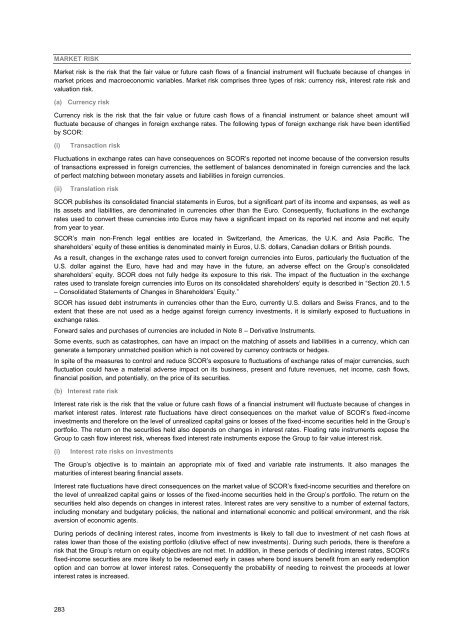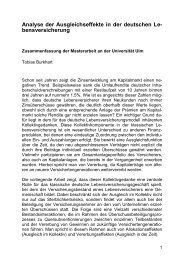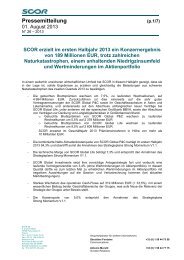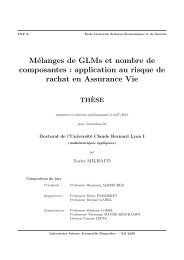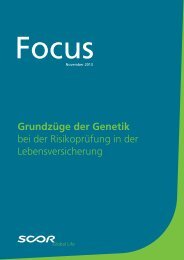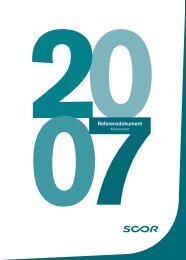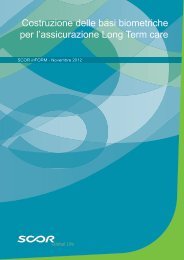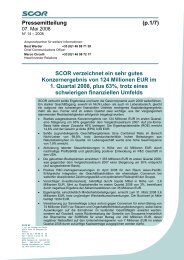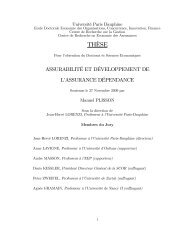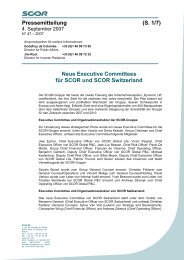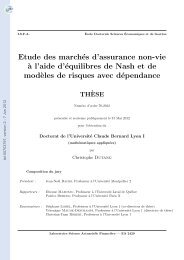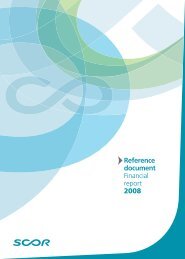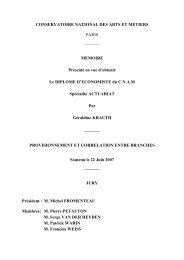4.4 Legal risk - Scor
4.4 Legal risk - Scor
4.4 Legal risk - Scor
You also want an ePaper? Increase the reach of your titles
YUMPU automatically turns print PDFs into web optimized ePapers that Google loves.
MARKET RISK<br />
Market <strong>risk</strong> is the <strong>risk</strong> that the fair value or future cash flows of a financial instrument will fluctuate because of changes in<br />
market prices and macroeconomic variables. Market <strong>risk</strong> comprises three types of <strong>risk</strong>: currency <strong>risk</strong>, interest rate <strong>risk</strong> and<br />
valuation <strong>risk</strong>.<br />
(a) Currency <strong>risk</strong><br />
Currency <strong>risk</strong> is the <strong>risk</strong> that the fair value or future cash flows of a financial instrument or balance sheet amount will<br />
fluctuate because of changes in foreign exchange rates. The following types of foreign exchange <strong>risk</strong> have been identified<br />
by SCOR:<br />
(i)<br />
Transaction <strong>risk</strong><br />
Fluctuations in exchange rates can have consequences on SCOR’s reported net income because of the conversion results<br />
of transactions expressed in foreign currencies, the settlement of balances denominated in foreign currencies and the lack<br />
of perfect matching between monetary assets and liabilities in foreign currencies.<br />
(ii)<br />
Translation <strong>risk</strong><br />
SCOR publishes its consolidated financial statements in Euros, but a significant part of its income and expenses, as well as<br />
its assets and liabilities, are denominated in currencies other than the Euro. Consequently, fluctuations in the exchange<br />
rates used to convert these currencies into Euros may have a significant impact on its reported net income and net equity<br />
from year to year.<br />
SCOR’s main non-French legal entities are located in Switzerland, the Americas, the U.K. and Asia Pacific. The<br />
shareholders’ equity of these entities is denominated mainly in Euros, U.S. dollars, Canadian dollars or British pounds.<br />
As a result, changes in the exchange rates used to convert foreign currencies into Euros, particularly the fluctuation of the<br />
U.S. dollar against the Euro, have had and may have in the future, an adverse effect on the Group’s consolidated<br />
shareholders’ equity. SCOR does not fully hedge its exposure to this <strong>risk</strong>. The impact of the fluctuation in the exchange<br />
rates used to translate foreign currencies into Euros on its consolidated shareholders’ equity is described in “Section 20.1.5<br />
– Consolidated Statements of Changes in Shareholders’ Equity.”<br />
SCOR has issued debt instruments in currencies other than the Euro, currently U.S. dollars and Swiss Francs, and to the<br />
extent that these are not used as a hedge against foreign currency investments, it is similarly exposed to fluctuations in<br />
exchange rates.<br />
Forward sales and purchases of currencies are included in Note 8 – Derivative Instruments.<br />
Some events, such as catastrophes, can have an impact on the matching of assets and liabilities in a currency, which can<br />
generate a temporary unmatched position which is not covered by currency contracts or hedges.<br />
In spite of the measures to control and reduce SCOR’s exposure to fluctuations of exchange rates of major currencies, such<br />
fluctuation could have a material adverse impact on its business, present and future revenues, net income, cash flows,<br />
financial position, and potentially, on the price of its securities.<br />
(b) Interest rate <strong>risk</strong><br />
Interest rate <strong>risk</strong> is the <strong>risk</strong> that the value or future cash flows of a financial instrument will fluctuate because of changes in<br />
market interest rates. Interest rate fluctuations have direct consequences on the market value of SCOR’s fixed-income<br />
investments and therefore on the level of unrealized capital gains or losses of the fixed-income securities held in the Group’s<br />
portfolio. The return on the securities held also depends on changes in interest rates. Floating rate instruments expose the<br />
Group to cash flow interest <strong>risk</strong>, whereas fixed interest rate instruments expose the Group to fair value interest <strong>risk</strong>.<br />
(i)<br />
Interest rate <strong>risk</strong>s on investments<br />
The Group’s objective is to maintain an appropriate mix of fixed and variable rate instruments. It also manages the<br />
maturities of interest bearing financial assets.<br />
Interest rate fluctuations have direct consequences on the market value of SCOR’s fixed-income securities and therefore on<br />
the level of unrealized capital gains or losses of the fixed-income securities held in the Group’s portfolio. The return on the<br />
securities held also depends on changes in interest rates. Interest rates are very sensitive to a number of external factors,<br />
including monetary and budgetary policies, the national and international economic and political environment, and the <strong>risk</strong><br />
aversion of economic agents.<br />
During periods of declining interest rates, income from investments is likely to fall due to investment of net cash flows at<br />
rates lower than those of the existing portfolio (dilutive effect of new investments). During such periods, there is therefore a<br />
<strong>risk</strong> that the Group’s return on equity objectives are not met. In addition, in these periods of declining interest rates, SCOR’s<br />
fixed-income securities are more likely to be redeemed early in cases where bond issuers benefit from an early redemption<br />
option and can borrow at lower interest rates. Consequently the probability of needing to reinvest the proceeds at lower<br />
interest rates is increased.<br />
283


